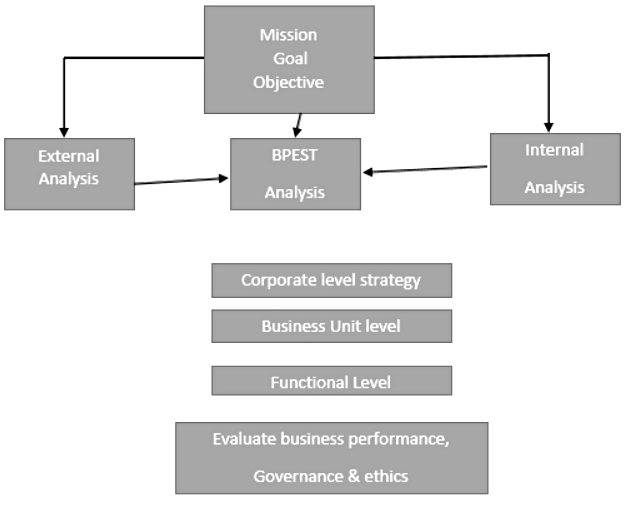Marketing strategy formulation and components of a marketing plan | Management Optional Notes for UPSC PDF Download
Introduction
- Formulating a marketing strategy involves defining the primary marketing objectives of a company, and providing a framework for decision-makers. This process involves a thorough analysis of the market, enabling strategists to determine effective marketing approaches that resonate with clients and entice them to engage with business services. Often conducted in teams, marketing strategy development benefits from collaborative efforts, fostering learning, creativity, and knowledge distribution within the organization, particularly in the context of new product development (Bharadwaj and Menon 2004).
- In theoretical contexts, a strategy is described as a company's positioning to gain a competitive advantage in the market (Juga 1999). The primary goal of a strategy is to ensure organizational effectiveness through timely and appropriate actions, aligning with the external environment. Marketing strategies aid firms in creating plans that recommend suitable products to the right market, thereby achieving a competitive edge. A well-crafted marketing strategy considers both internal and external constraints, aiming to accurately position products while maintaining overall market relevance.
- Research in marketing strategy has predominantly focused on either formulation or implementation. Formulation research explores the impact of variables on the development of marketing strategies, addressing practical aspects and the role of marketing strategy in real-world scenarios (Mintzberg 1994).
- The success of marketing strategy formulation hinges on three key elements: marketing strategy performance, creativity, and improvisation. Marketing strategy performance measures a team's ability to develop a comprehensive marketing strategy for their technology, representing a global performance measure at the team level. Creativity in marketing strategy refers to the extent to which the strategic plan deviates meaningfully from existing marketing practices (Andrews and Smith 1996). Creativity enhances performance by fostering problem recognition, hypothesis development, open communication of ideas, and challenging the status quo (Gilson and Shalley 2004). Improvisation in marketing strategy involves adapting the strategy over time, responding to unforeseen situations and changes in markets and technologies (Brown and Eisenhardt 1997). In uncertain environments, improvisation becomes essential for survival, and individuals with access to internal and external information are more likely to engage in real-time improvisation.
- Many experts recommend initiating the marketing strategy formulation process with a product concept that identifies various benefits, both tangible and intangible, as perceived by potential buyers (Levitt, 1974).

Components of Marketing Plan
The marketing plan is a crucial tool for the growth of any business, providing a clear roadmap for implementing strategies and actions. It encompasses everything from identifying the target market to outlining specific steps for developing marketing systems and strategies. Marketing planning is essential for establishing a systematic and long-term approach, ensuring organizational goals, and gaining support from both marketers and non-marketers. It helps in recognizing competitive advantages and seizing opportunities that competitors might overlook.
Developing a robust marketing plan requires extensive research, time, and commitment, but the benefits can lead to significant business success. The primary components of a marketing plan include market research, target market identification, marketing mix development, distribution channel selection, and market attractiveness analysis.
The fundamental elements of a marketing plan are as follows:
- Situational Analysis: This involves assessing the macro forces and major players in the business environment through SWOT analysis, considering economic, political-legal, social-cultural, and technological factors.
- Objectives: These represent the expectations of the organization from its marketing efforts, including financial and marketing goals. Objectives are derived from senior management and can be strategic thrusts or specific objectives related to products.
- Marketing Strategy: This involves determining the most effective course of action to achieve objectives, focusing on target markets, competitor targets, and creating a competitive advantage.
- Product/Service Strategy: Decisions on the mix of products and services, including brand names, features, quality, design, packaging, warranties, and accompanying services.
- Pricing Strategy: Setting prices relative to competitors and assessing the impact on sales volume, considering list prices, discounts, credit terms, and payment periods.
- Place/Location Strategy: Decisions related to the business location and distribution channels, including outlet locations, transportation methods, and inventory levels.
- Promotional Strategy: Determining how to promote the business to make customers aware and motivated to buy, involving advertising, personal selling, direct marketing, and public relations.
- Positioning Strategy: Defining the values the company wants customers to associate with it and how it stands out from the competition.
- Tactics: Detailed explanations of the actions and day-to-day activities related to the 4Ps (Product, Price, Place, Promotion).
- Implementation Activities: Listing tasks, providing detailed descriptions, assigning responsibilities, and setting target completion dates for each marketing strategy.
- Marketing Budget: Allocating funds for the planned marketing activities, decided upon by senior management.
- Controls: Establishing review periods and measures to assess progress toward goals, allowing for corrective actions if performance deviates from objectives.
In essence, a Marketing Plan is a documented blueprint designed to promote the products/services of a new business. It serves as a testament to the company's commitment to achieving market objectives, outlining strategies and plans aimed at expanding market share and enticing customers. A successful Marketing Plan is underpinned by meticulously gathered information about the market, customers, and competitors, occasionally incorporating professional recommendations.
FAQs on Marketing strategy formulation and components of a marketing plan - Management Optional Notes for UPSC
| 1. What is marketing strategy formulation? |  |
| 2. What are the components of a marketing plan? |  |
| 3. How can market research help in marketing strategy formulation? |  |
| 4. What are marketing objectives? |  |
| 5. How can performance evaluation contribute to the effectiveness of a marketing plan? |  |

|
Explore Courses for UPSC exam
|

|
















